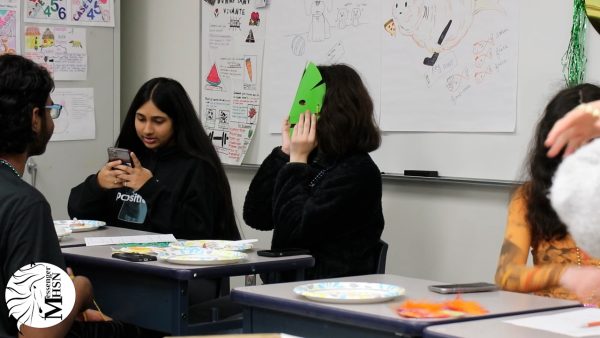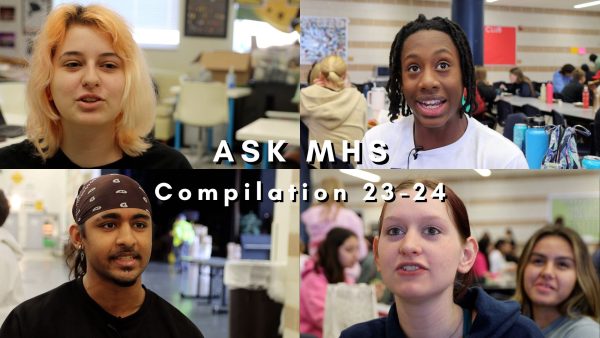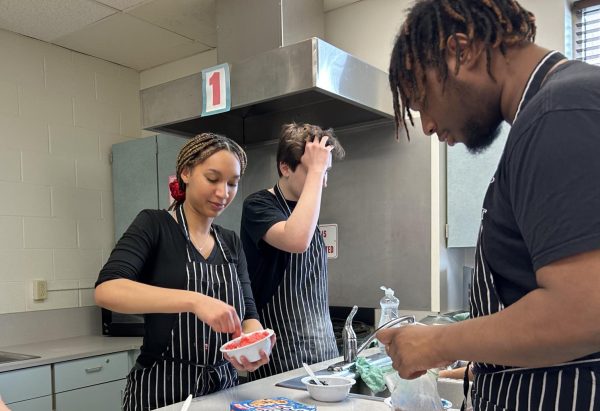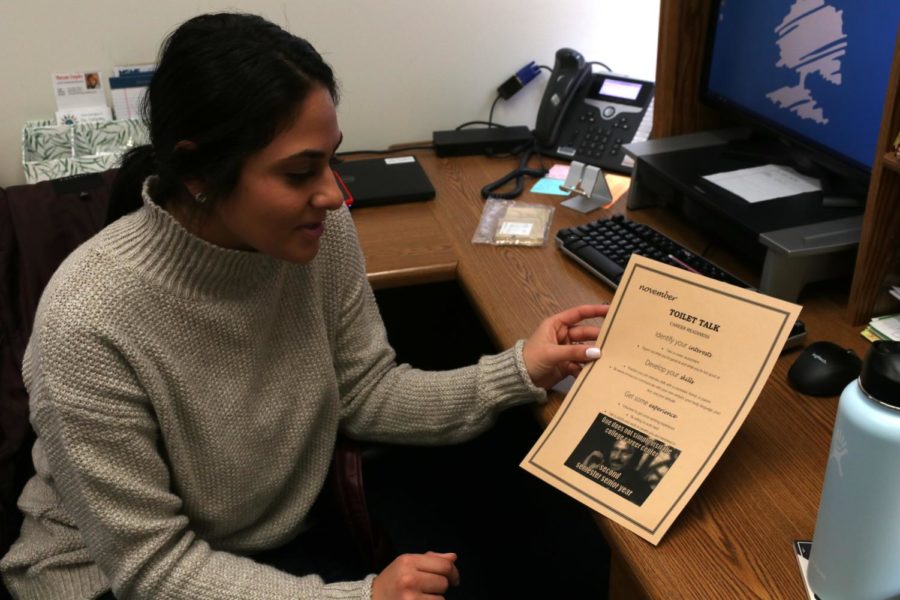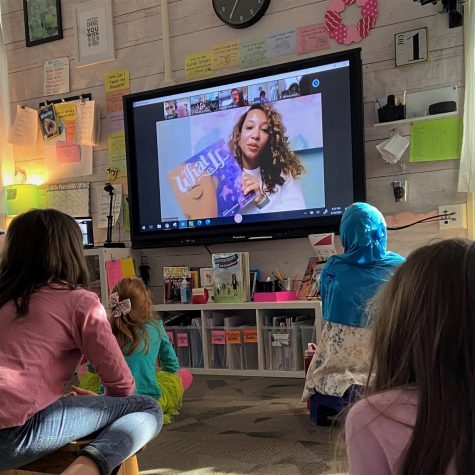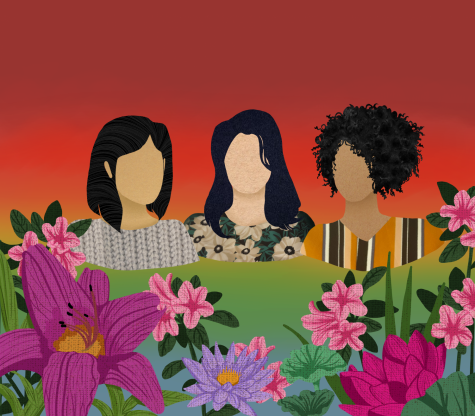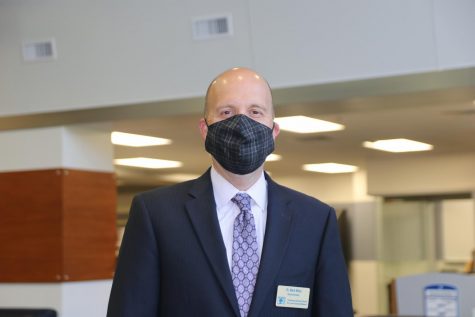Lessons in the Lavatory With New Guidance Counselor
Media by Lauren Pickett
Layla Torgoley, guidance counselor, describes the content on her November “Career Readiness” toilet talk poster. Torgoley developed this idea from other counselors on social media and from her graduate, UMSL.
Layla Torgoley, guidance counselor, said she may have more in common with students than they may realize.
Having graduated from MHS in 2013 and as a UMSL alumni, she describes herself as an Iraninan first generation immigrant as she reflects on her journey through K-12 in RSD.
“I wouldn’t say it was challenging growing up, but I would say it was very different than what my peers went through,” Torgoley said. “Within our culture, there’s a different perception of mental health than there is here. With MHS being such a diverse group, I enjoy connecting with people who have a similar background as me, and letting them know that it’s okay to talk about it.”
She said as a younger counselor, she hopes to bring fresh ideas to MHS, such as her October “Bullying Prevention” and November “Career Readiness” Toilet Talk posters placed in bathroom stalls throughout the school.
Each poster provides a brief list of information about the topic. For example, the poster for this month has three subheadings: “Identify your interests,” “Develop your skills” and “Get some experience.” Below the heading is a bulleted list of suggestions to achieve the above such as “take a career assessment” and “talk to adults who work in careers you are interested in.”
She said she developed the idea from a school counseling page on social media as well as a similar concept in her graduate school.
“When I did it the first month, I was kind of nervous because kids might tear them down or think it’s a joke,” Torgoley said. “Luckily, as this is my second month doing it, all my posters except for five were still up.”
Before she placed her first posters in the stalls, she said she knew they would be taken down or vandalized, so she decided to laminate them. Even with posters beginning removed by students in bathrooms across campus, she said her efforts remain effective.
Torgoley said the inspiration for her October edition stemmed from National Bullying Prevention Month, and this month she said she thought of how seniors are focusing on college. For December, she said she envisions a study skills topic because of upcoming finals.
If students were able to retain information from her posters, Torgoley said she would be satisfied with her efforts.
From what I’ve seen with the cyber bullying one, I definitely think it’s a step in the right direction to start a conversation, but I do feel like more important topics could be covered.
— Laura Dorris
Torgoley said although the culture at MHS has shifted to better communicate mental health awareness since she was in school, she wants to see a bigger push to talk about it so students wouldn’t be intimidated by a mental health poster, if she chose to create one in the future.
She also said the posters allow her to connect with students and to voice her opinion outside of the office.
She would like to connect her content to counselors by suggesting students to seek the Guidance Office for any questions. Torgloey said it may be important to reach out to student-led clubs for additional ideas and collaboration opportunities.
Laura Dorris, junior, said it was refreshing to know the posters were made by a guidance counselor and they are expanding their efforts instead of waiting for students to approach them. She also said she’s glad to see these topics are not being overlooked as it may demonstrate they aren’t as important.
“From what I’ve seen with the cyberbullying one, I definitely think it’s a step in the right direction to start a conversation, but I do feel like more important topics could be covered,” Dorris said.
She said the posters can be more impactful if they include topics like mental illness and sex ed, or if clubs like Gay Straight Alliance (GSA) or Mustangs For Mental Health (M4MH) were involved in future posters.
Catie Sanazaro, drama and speech teacher, said continuing the toilet talk posters would only be effective if the topics connect to students and address their needs.
She said the content in the cartoon for the Nov. edition was relevant; however, she said most teenagers might not relate to the Game of Thrones character and quote depicted.
Sanazaro said the placement decisions in the bathroom is helpful to draw more attention to her content rather than displaying them in hallways.
“I would say to keep it positive versus negative with topics like cyberbullying,” Sanazaro said. “Mental health is another topic that is hit on a lot, and it should be a topic you can cover quickly, especially for the 60-second attention span we have in the bathroom. It could be a message like, ‘contact this office if you feel stressed out.’ Right now it’s almost too much, it needs to be short and sweet.”
Your donation will support the student journalists of Marquette High School. Your contribution will allow us to purchase equipment and cover our annual website hosting costs. You may become a PATRON by making a donation at one of these levels: White/$30, Green/$50, Blue/$100. Patron names will be published in the print newsmagazine, on the website and once per quarter on our social media accounts.
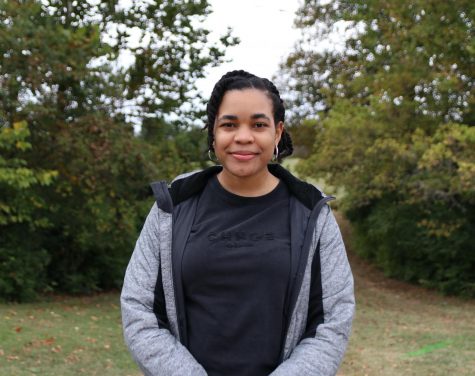
Lauren Pickett, senior, is the In-Depth Editor for the MHS Messenger. This is her second full year on staff. Also, Lauren participates in two other activities:...



